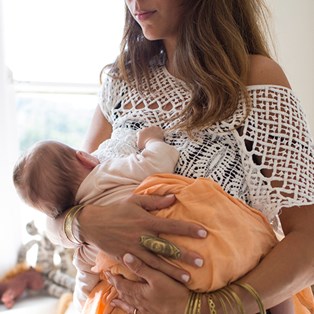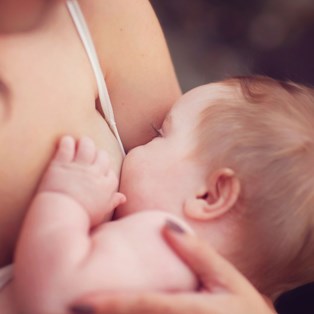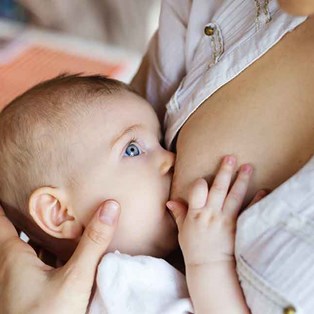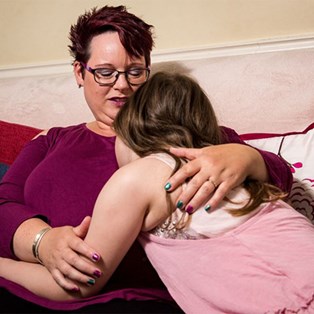Breastfeeding in public in Australia: How to, laws & tips
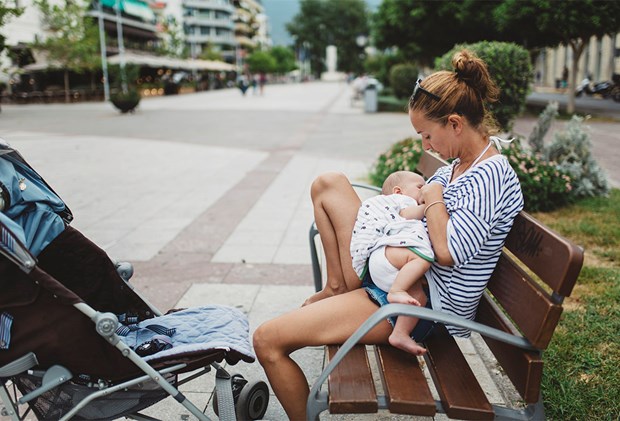
Everything you need to know about breastfeeding in public
By Frances Sheen
March 07 2019
How to breastfeed in public
You may feel nervous about breastfeeding in public - that's entirely normal and totally natural, especially the first time you do it.
For most breastfeeding mothers, it can take a while to get used to feeding bub in public places.
But the great thing about breastfeeding in public is that you have everything you need to feed your baby at all times! And the breastmilk is always the right temperature!
However, other people’s reactions can still make you feel nervous but don't panic.
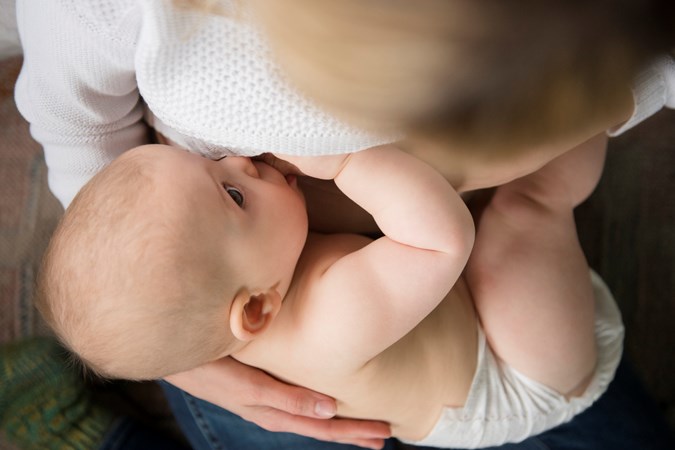
Breastfeeding baby
1. Breastfeeding in public - the law.
It's important to know your legal rights.
In Australian Federal Law, breastfeeding is your right - not your privilege.
Separate to state laws, the Federal Sex Discrimination Act 1984, makes it illegal in Australia to discriminate against a person either directly or indirectly on the grounds of breastfeeding.
But what does discrimination mean?
Direct discrimination is when a person treats you less favourably than another person. For example, it would be discrimination if a waiter refused to serve you in a cafe if you were breastfeeding there.
Indirect discrimination is when there is a disadvantage a particular group because of say a general rule applied. In this case women who are breastfeeding.
For example, your employer may say you are only allowed three breaks a day of ten minutes. A condition like this would disadvantage lactating women who need to express milk for a breastfed baby to have now or later.
The Australian Human Rights Commission produce this document, the Getting to Know the Sex Discrimination Act: A Guide for Young Women. It doesn't mention breastfeeding directly, but it does explain your rights under the Act.
What about State and Territory laws?
In addition to the protection offered under the Federal Sex Discrimination Act 1984, the different Australian States and Territories have their own laws to protect the rights of breastfeeding women.
Details vary, but overall this is a general guide.
Australian Capital Territory: Discrimination on the basis of breastfeeding is illegal in the areas of: provision of goods and services, accommodation, financial services, employment, sport, education, access to premises, access to membership in a trade or professional organisation, membership of or services in a licensed club, business partnerships, requests for information and unlawful advertising.
New South Wales: Discrimination and harassment on the grounds of sex is illegal in the contexts of opportunities in employment, state education, goods and services, accommodation and registered clubs. This includes breastfeeding.
Northern Territory: Discrimination or harassment on the basis of breastfeeding is illegal in the areas of education, work, accommodation, goods, services and facilities, clubs, insurance and superannuation. It is also illegal NOT to accomodate for someone's special needs.
Queensland: Discrimination on the basis of breastfeeding is explicitly illegal in all areas of public life.
South Australia: It is illegal to discriminate against someone in the areas of accommodation, customer service and education because of their association with a child, which includes breastfeeding.
Tasmania: Discrimination is illegal with breastfeeding in the areas of: education, employment, provision of goods, facilities and services, clubs, state laws and programs, awards and industrial agreements.
Victoria: Discrimination on the basis of breastfeeding is illegal in the areas of accommodation, clubs, education, employment, goods and services, selling and transferring land, and sport.
Western Australia: Discrimination on the grounds of breastfeeding is prohibited in employment, education, access to places and vehicles, provision of goods, services and facilities, accommodation, disposal of land, clubs, application forms, advertisements, insurance (in some instances) and sport (in some instances).
So does this mean I can breastfeed anywhere?
Yes. According to the Australian Breastfeeding Association, "A mother has the right to breastfeed her baby wherever she happens to be. This right is legally supported through the Sex Discrimination Act 1984. The requirements of a baby are different to those of an adult, and all mothers have the right to meet their baby's needs. A hungry baby shouldn't be expected to wait, and no mother can be forced to ignore the needs of her baby."
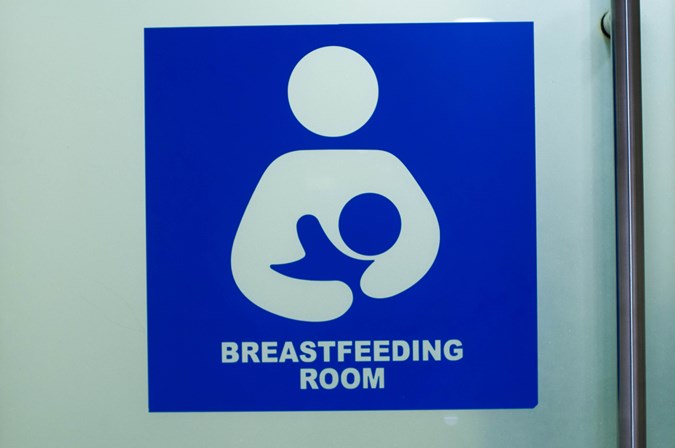
If there's a parent's room or baby's room provided do I have to use it?
No. That's a service provided but there's no legal right to make you move in there to breast feed. It's entirely your choice.
If there is a sign prohibiting eating or drinking, do I have to follow that?
No. If your baby is hungry for breastmilk you have the right to feed. However, you might not want to if there's a valid health reason - like there are chemicals or dangerous substances nearby. But that's up to you.
What if I don't have my baby with me, but I need to express breastmilk?
It doesn't matter if your baby is with you or not. Your right to express breastmilk for your baby protected under the Sex Discrimination Act 1984.
Can I breastfeed in a shop?
Yes you can.
Can I breastfeed in a cafe or restaurant?
Yes, you can and you can't be asked to cover up or move to another area that is easier for the restaurant to work around. You can feed where you're sitting.
Can I breastfeed in a swimming pool?
Yes, you can. Back in 2018, an Australian mother was asked to leave her local swimming pool while she breastfed her baby in the water while watching her toddler swim.
“The lifeguard, a young female, asked me to leave because they don’t want milk getting in the pool and because my 10-month-old son might vomit in the pool,” the anonymous mum wrote on the Newcastle Hunter Mums Group on Facebook.
Her experience prompted a heated debate, but legally she was allowed to breastfeed at the pool.
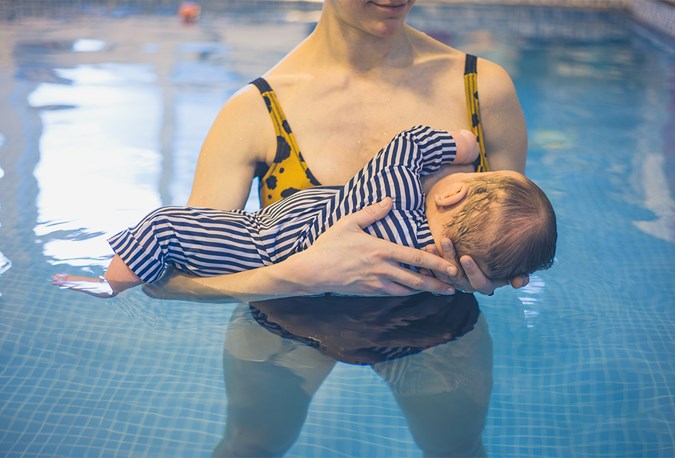
What should I do if I have been asked NOT to breastfeed in public?
You can lodge a complaint with either the state or federal agency, but not both. You can ask for free advice from the Federal Commission on 1300 656 419 or online. You can also contact your state or territory agency before deciding who you will make your complaint with.
Valid complaints are dealt with by conciliation - this means both people involved talk through the grievance with someone impartial and then they settle the matter. This could be an apology, financial compensation, access to facilities previously denied, or something else that is agreed upon.
However, if you have your legal facts at hand, you will have more confidence to put your case across at the time.
2. Breastfeeding in public tips
If you're a new mother and new to public breastfeeding, there are a few ways you can make the experience easier for yourself and your baby or toddler.
- Relax and know your rights. You have every right to feed your baby when he is hungry. No mother can be forced to ignore the needs of her baby - and you have no reason to be apologise for this.
- Find a comfortable spot. Breastfeeding can be hard to get the hang of so find somewhere that feels good for you - sitting down on a park bench, or a restaurant chair. You’ll need space.
- Create your own ‘privacy zone’. Most mothers don't like to feel exposed as they breastfeed - they carry a light weight baby cover up or muslin to through over their shoulder so the breast and the baby's head is covered (this also can help an unsettled baby who likes looking around!). This is often called a breastfeeding cover up.
- Wear two piece outfits, or clothes with nursing slits. You're probably wearing a nursing bra anyway with easy easy access to your breast. You can also buy special breastfeeding tops or singlets. When you pull up your top, the fabric covers the top of your breast, and the baby covers the rest. Or the strap has a popper and you can easily flip it down. Bring the baby in close to you first, then open your top. Many nursing clothes are designed so that that they don’t look too different from your regular clothes.
- Baby slings can double as hands free carriers and are one way to NIP without anyone noticing. With a little practice, you can learn to nurse while you’re walking around, and most babies love to
- Try to feed your baby before he becomes too hungry and cries or gets very unsettled. If your baby is hysterical, getting him to latch on and feed properly can be difficult and you're more likely to feel upset or self-sconscious about the whole experience.
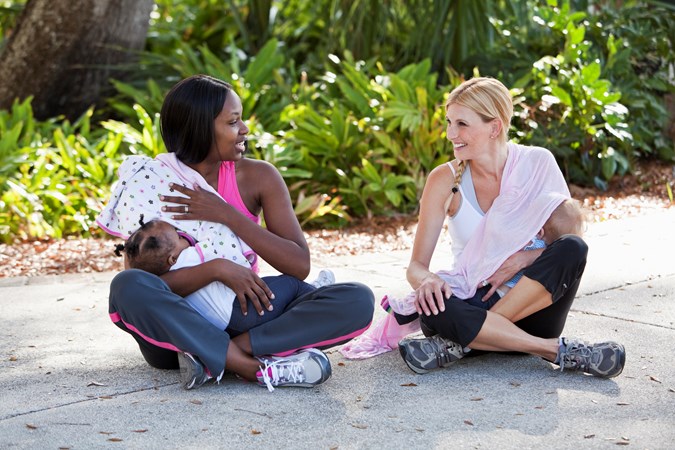
Why are people offended if I breastfeed in public?
This is a public debate that rages on - and there are many complex reasons that people feel uncomfortable with a woman feeding her child in front of them. After all, it's a natural way to feed. It can be a generational divide or many men feel awkward around a breastfeeding mum. Others simply don't understand the law and what is allowed.
That's why it's a good idea to open the debate and discuss it with someone if they start to talk to you about why they have a problem with it.
MORE ON BREASTFEEDING...
Why your baby might be unsettled when breastfeeding
Breastfeeding problems and how to fix them





